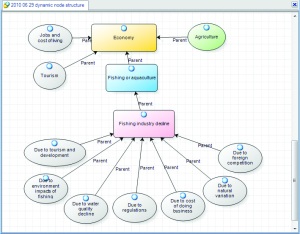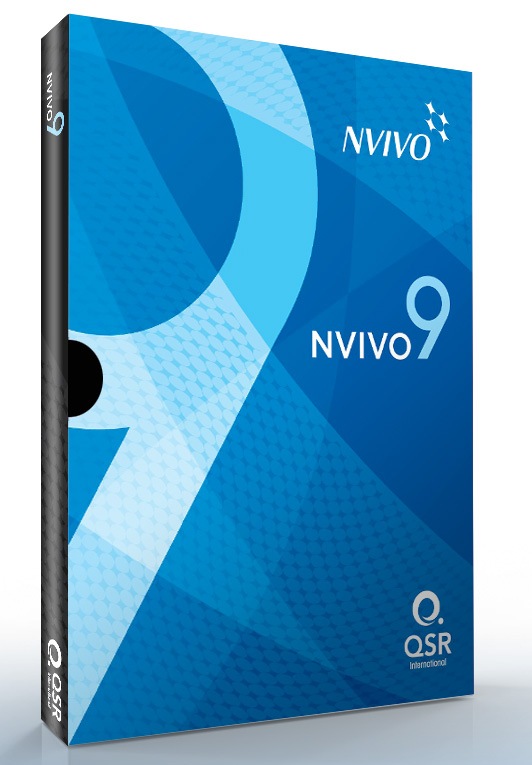In my hand I hold a ‘Certificate of Attendance’ for attending an ‘Induction to NVivo Training’. This is significant because I am now able to use a computer aided qualitative data analysis software to analyse a number of interview transcripts I have from a current education technology research project.
SIGNIFICANT DEVELOPMENT

Bryman (2009) points out that one of the most significant developments in qualitative research in the last 20 years is the appearance of computer software that can assist in qualitative data analysis. NVivo is one such tool that attempts to support the analysis of word rich text by removing many of the clerical tasks associated with the manual coding and retrieving of data.
QUALITATIVE VS. QUANTITATIVE
According to Bryman (2009) there is a distinction to be made between qualitative and quantitative research: qualitative research can be construed as a research strategy that usually emphasises words in the collection and analysis of data. In contrast, quantitative research can be seen as emphasising numbers. For Creswell (2008) this understanding is based on the basic philosophical assumptions researchers bring to the study and the types of research strategies used overall in the research as well as the specific methods employed in conducting these strategies.

According to QSR international, the creators of NVivo, the software is important to qualitative research as it can help researchers easily organise and analyse unstructured and non-numerical information. There is a widespread mental image of a researcher dealing with qualitative data and they are trying to navigate their way through piles of paper, sticky notes and highlighters.
 Well, NVivo provides a workspace to help you at every stage of your project from organizing and classifying your material, through to analysis, and then sharing and reporting.
Well, NVivo provides a workspace to help you at every stage of your project from organizing and classifying your material, through to analysis, and then sharing and reporting.
NVivo’s workspace is designed using Microsoft user interface guidelines, so it should looks familiar and is easy to use. NVivo handles a large number of data, including Word documents, PDFs, audio files, database tables, spreadsheets, videos and pictures.
 Once the document is imported, the researcher can work through the information, highlight key points, allowing for quick recall or analysis later. The data can then be easily visualised and organised with NVivo ‘nodes’ and ‘models’ like virtual filing boxes they allow you to see all information on a theme summarized together and in visual form.
Once the document is imported, the researcher can work through the information, highlight key points, allowing for quick recall or analysis later. The data can then be easily visualised and organised with NVivo ‘nodes’ and ‘models’ like virtual filing boxes they allow you to see all information on a theme summarized together and in visual form.
Qualitative research generally follows the following process:
NVivo has the potential to support the researcher throughout this process, but I think NVivo really comes in use during the ‘Interpretation of data stage’, where the software can be used to organize and manage the data making the development of concepts and theory easier and supporting the write up.
I think NVivo has the potential to effectively and efficiently support qualitative data analysis. However, it is not easy to understand the software and reading or watching self-help material online is simply not enough; one must be given a basic guide by a knowledgable user. Furthermore, qualitative research softwares like NVivo doesn’t do the thinking for you; it simply provides a sophisticated workspace that enables you to work through your information.
Access to NVivo at City University London is very limited. Essentially the researchers must purchase their own licenses, either personally or through their departments. Unlike SPSS, the student build machines do not have NVivo, so both undergraduate and post-graduate students must fund their own licenses. At the LDC, we have a number of licenses for NVivo 8, which we purchased a little while ago.
THE TRAINING
The training was by delivered by Elizabeth Wiredu founder of Data Solutions Services (DSS) , who is a QSR approved trainer and consultant. DSS provides tailored and dedicated training and consultancy services on NVivo and medical statistics. The training provided an opportunity to engage with the software under the guidance of an expert user. The benefit of training with Elizabeth was that she is a researcher herself, who uses NVivo to analyse qualitative data gathered in the medical field. Furthermore, it was positive that the training was designed to give time for delegates to begin analysing of our own research.
SUPPORT
There is a sizable community of researchers using Nvivo; for this reason QSR have created a Forum to enable communication. This enables researchers to ask and answer questions
Also, there are official online video tutorials to get further information should you need it after the training.
THANKS
I would like to thank the Leadership and Staff Development Unit (L&SDU) at City University London for funding my place in this very useful training.
Ajmal Sultany (Research Assistant)
Follow me on Twitter
POLL
[polldaddy poll=5089732]


